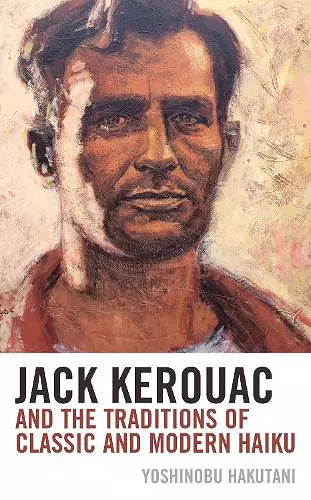Jack Kerouac and the Traditions of Classic and Modern Haiku
Format:Hardback
Publisher:Lexington Books
Published:14th Dec '18
Currently unavailable, and unfortunately no date known when it will be back
This hardback is available in another edition too:
- Paperback£35.00(9781498558297)

Jack Kerouac and the Traditions of Classic and Modern Haiku is a reading of the haiku collected in Jack Kerouac’s Book of Haikus, edited by Regina Weinreich, (2003), one of the two largest collections of English haiku. “Above all,” Kerouac wrote in his journal, “a Haiku must be very simple and free of all poetic trickery and makes a little picture and yet be as airy and graceful as a Vivaldi Pastorella.” Before trying his hand at composing haiku, Kerouac learned, as did Wright, the theory and technique of haiku from R. H. Blyth, the most influential haiku scholar and critic. Most of Kerouac’s haiku reflect eastern philosophies―Confucianism, Buddhist ontology, and Zen―, as do classic haiku. A son of devout French Canadian Catholic parents, the young Kerouac was impressed with Christian doctrine, but later was inspired by Buddhism. In his haiku Kerouc conflates Christian doctrine of mercy with that of Buddhism. Classic haiku taught Kerouac that not only must human beings treat their fellow human beings with respect and compassion, but they must also treat nonhuman beings such as animals, insects, plants, and flowers as their equals. Many of Kerouac’s haiku can be read as modern haiku for the technique of beat poetics he applied. All in all, Kerouac’s haiku express the worldview that human beings are not at the center of the universe.
Hakutani offers a highly original, intensive study of the importance of haiku poetry in Jack Kerouac's development as well as its significance for a wide range of other American writers such as Ezra Pound, Richard Wright, Gary Snyder, and Sonia Sanchez. Grounded in a rich understanding of the history of Japanese haiku and its underpinnings in Buddhist and Confucian thought, this book will be an invaluable resource for both specialized scholars and general readers. -- Robert Butler, author of Contemporary African American Fiction: The Open Journey
A penetrating, readable examination of Kerouac’s spontaneous and spiritually infused one-breath poetry. With clarity and scholarly precision Hakutani tells the story of how the haiku of Japanese literary tradition morphed into an exciting, international poetic genre of which Kerouac became one of the earliest and most influential masters. -- David G. Lanoue, Xavier University
In this innovative study, Hakutani explores Kerouac’s formative encounters with classic and modern haiku, situating his work within a vibrant tradition of East-West literary exchanges, from New England Transcendentalism to modernism, and from the Beat movement to African-American jazz haiku. A major contribution to transpacific American literary scholarship. -- Anita Patterson, Boston University
ISBN: 9781498558273
Dimensions: 236mm x 159mm x 22mm
Weight: 472g
222 pages